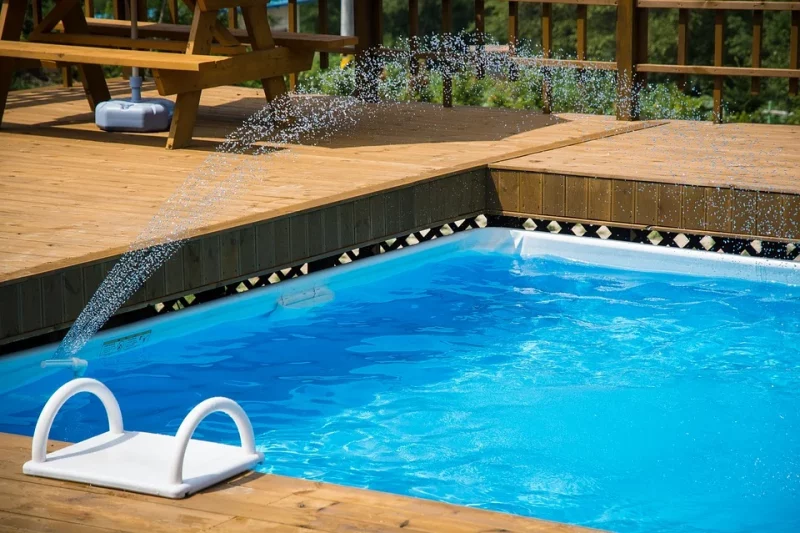For those living somewhere with a cold climate, a pool heater can help extend the swimming season, which is why they are interested in knowing how hot can a pool heater get. We will answer that particular question in this post.
Typically, most people want a 10-degree increase in the pool water temperature. On average, most swimming pools have a temperature of about 86 up to 88 degrees Fahrenheit.
But others have a higher temperature of about 90 degrees Fahrenheit. In addition, some swimming pools are heated to temperatures higher than 104 degrees Fahrenheit. This limit is followed to all swimming pools for safety purposes. Do you want to know more about this? Keep reading below!
Factors Affecting The Efficiency Of The Pool Heater
The efficiency of your pool heater to achieve your desired temperature for your swimming pool depends on some factors, including the pool location and size of the pool heater. Let us discuss each of them below.
#1. Location
Both the location of the pool and the weather condition play a crucial role in determining the efficiency of the pool heater. This also means that how to hit can a pool heater get is affected by those factors. More humidity and warmth in the air means that the pool heater will also be more efficient. Other factors such as wind conditions and water features may also affect the temperature that your pool heater can achieve. The same is true with the solar and covers you put over your swimming pool since they will help to trap the heat inside the pool.
#2. Size
Sizing the swimming properly with the right pool heater is crucial. The unit should not be undersized or oversized at the same time. An undersized pool heater won’t provide enough power to attain your desired temperature.
How Hot Your Pool Heater Get?
Your system will be shocked if you jump in a cold swimming pool during a hot day. But swimming in a hot pool is not fun either. So the question is: how hot can a pool heater get? Generally, residential pools have an average temperature of about 78 to 82 degrees Fahrenheit. But you need to be aware that some pool temperatures can pose a danger to some at-risk groups. This can also make the swimming pool easily contaminated. In contrast, some temperatures are ideal for athletic activities. Essentially, it depends on who is using the pool.
Benefits Of Controlled Swimming Pool Temperature
Aside from the swimmers’ safety, keeping the swimming pool’s temperature steady and falling within the correct range will also protect the pool. Let us discuss the benefits that you will enjoy in this section.
#1. Bacteria and algae control
The battle with pool contaminants is constant, and usually, you can control them by using a sanitizer such as chlorine and filtration. But keeping the pool temperature too high will attract bacteria and algae. When the water temperature rises at about 85 degrees Fahrenheit, algae and bacteria get comfy and will start to reproduce quickly. Although keeping the temperature below that point will not eliminate those contaminants, it will be hard for them to grow. Therefore, if you need to increase the pool temperature as per the request of the quest, you need to shock it more frequently so that contaminants will not bloom.
#2. Balanced water
As mentioned earlier, bacteria and algae can quickly grow with warm pool water. This also means that the pool’s chlorine or any other sanitizer needs to work even harder to get rid of them. In other words, the sanitizer will deplete more quickly, making the pool chemistry unbalanced. For this instance, you will need to add chlorine more frequently. With that being said, another benefit for keeping the pool temperature at the proper range will lead to savings on chemicals.
Measuring Pool Temperature
Every pool heater has a built-in thermostat that will allow you to set the desired temperature. However, this may not displace the accurate temperature of the pool water. Therefore, you can supplement it with a thermometer designed to acquire the proper temperature reading for swimming pools. You can choose from three thermometers, including infrared, digital, and analog. A digital thermometer is more recommended for cost-effectiveness and better accuracy. An analog thermometer can be hard to read, while an infrared thermometer is usually expensive. You may also want to read about average pool heater costs.
It’s A Wrap!
After you have read the entire post, you sure have recognized already that some factors can influence the answer to the question: how hot can a pool heater get. Wind conditions, water features, and ambient temperature are crucial in achieving your desired temperature. Furthermore, you can maintain the heat of the pool using some covers, including liquid and solar covers.
Again, remember that it’s essential to maintain the temperature at a suitable range. This is both for the safety and protection of your swimming pool. Plus, it will also lead to more cost savings. Finally, you may want to read related articles; know how to turn on a pool heater and how long does a pool heater lasts. That’s it for this post, folks! Thank you for reading!

